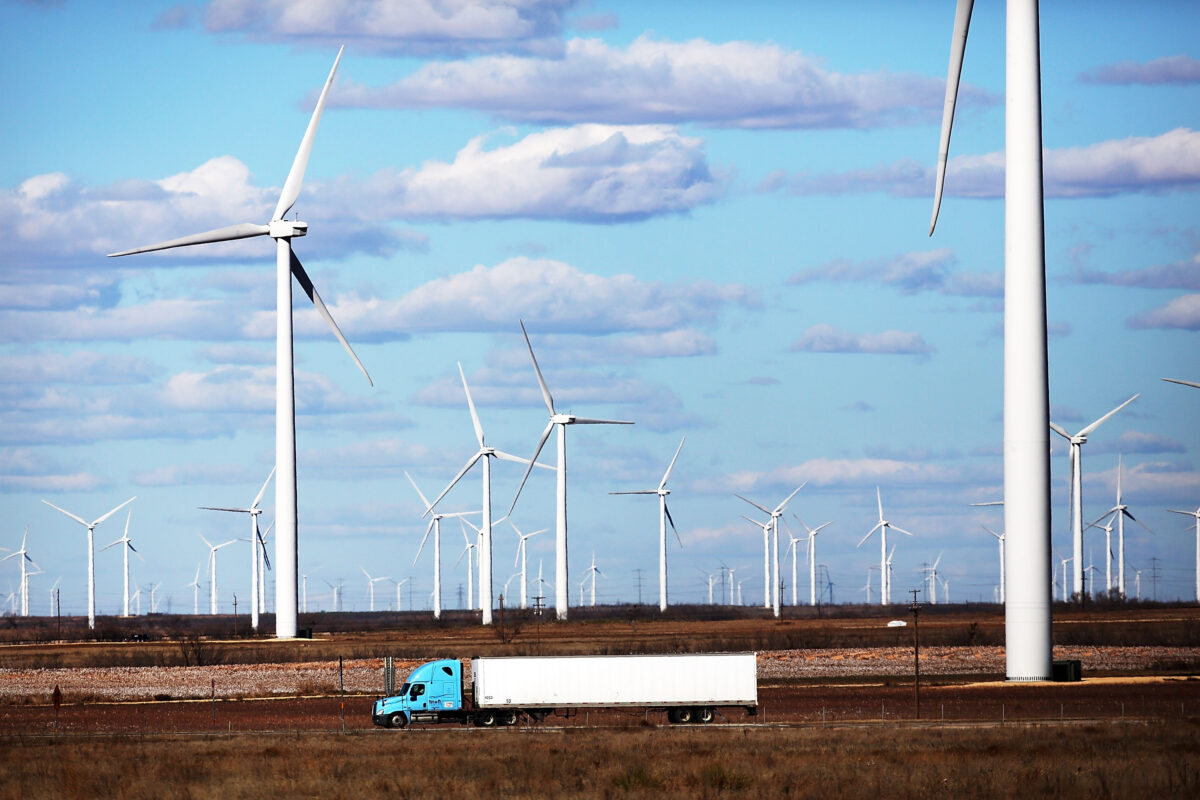Chinese Corn Mill Project in North Dakota Faces Security Panel Review as Final Hurdle
WASHINGTON—A corn mill investment by a Chinese company in the city of Grand Forks, North Dakota, has put a small city of a population under 60,000 on the map for many across the nation.The two Senators representing the state have called out national security concerns associated with the venture, as the land is within 15 miles of the Grand Forks Air Force base, which houses sensitive drone, satellite, and surveillance technology. As a result, the Committee on Foreign Investment in the United States (CFIUS), an interagency panel overseen by the Treasury Department that scrutinizes foreign investments for national security risks, is conducting a review to determine whether the transaction is one of the “covered transactions” in the committee’s jurisdiction. The city of Grand Forks announced the deal in November 2021 and approved the development agreement in July. Fufeng USA, a subsidiary of Chinese company Fufeng Group, plans to build a corn milling factory on the 370 acres of farmland it bought within close approximately to the Grand Forks Air Force base. Gathering over 5,000 signatures, Grand Forks citizens tried to force a public vote on the Fufeng project, taking the decision away from the city council. However, in April, the city auditor disqualified the signatures as “insufficient.” In early May, citizens brought the issue to the local district court. but a judge later ruled in August that the project would be the city’s decision. Now, a CFIUS review looks to be the final hurdle Fufeng has to overcome before setting up shop in Grand Forks. “Regarding the CFIUS inquiry, the City will make a further determination on how best to move forward once a further determination is made this week,” Todd Feland, the city administrator of Grand Forks, said in an email to The Epoch Times. “In the meantime, the City continues to move forward on other due diligence efforts, mainly in the engineering and environmental areas,” he added. According to Feland, Fufeng USA filed a voluntary submission to CFIUS in early August. The Epoch Times has reached out to Fufeng USA for comment. Airmen assigned to the 319th Aircraft Maintenance Squadron from Grand Forks Air Force Base, North Dakota, perform a maintenance check on a drone on June 6, 2022. (U.S. Air Force photo by Senior Airman Ashley Richards) Possible Outcome of CFIUS Review Giovanna M. Cinelli, a partner at the international law firm Morgan, Lewis & Bockius LLP and head of the firm’s global international trade and national security practice, said that the transaction remains an open issue until CFIUS makes its final decision. This is, in part, because the committee has the authority to impact the deal through mitigation measures that include unwinding the transaction. According to Cinelli, if the committee decides the transaction is out of its jurisdiction, that is, not a “covered transaction,” then the Fufeng deal is cleared. But if it decides that the deal is within its jurisdiction, CFIUS may reject the filing as incomplete or inadequate, and request more information. It may also kick off its 45-day investigation, or proceed with a mitigation agreement if the committee thinks it knows enough about the transaction that it doesn’t have to go through with the full investigation period. Two recent high-profile China-related CFIUS reviews involved the biggest pork producer in America, and a 140,000-acre wind farm in Val Verde County, Texas. The Blue Hills Wind Farm is within a few dozen miles of the U.S.-Mexico border and Laughlin Air Force Base, a training ground for military pilots. CFIUS cleared both cases: the acquisition of Smithfield Foods in September 2013, reportedly without a mitigation agreement, and the Texas wind farm in June 2020, with a mitigation agreement. Through the acquisition of Smithfield Foods, Chinese company Shuanghui International Holdings, now WH group, got more than 140,000 acres of land in the United States, mainly in North Carolina, Missouri, Utah, Virginia, Colorado, and Oklahoma, according to a May report by U.S.-China Economic and Security Review Commission. Cinelli doesn’t think it’s automatic that CFIUS will clear the Fufeng case. She described the possibility of the deal being approved but with mitigation agreements as an “open issue,” adding that this is also “potentially a situation where they [CFIUS] may come back and say no.” “CFIUS, being chaired by the Treasury Department, is very interested in encouraging foreign investment, and that objective remains a key focus in the most recent legislation updating CFIUS’ authority, the Foreign Investment Risk Review Modernization Act (FIRRMA),” Cinelli told The Epoch Times. FIRRMA, enacted in 2018, broadened the scope of transactions under CFIUS’s review as it set to “modernize and strengthen” the committee’s process in reviewing national security risks associated with foreign investments. However, building a corn mill facility takes time and requires the completion of variou

WASHINGTON—A corn mill investment by a Chinese company in the city of Grand Forks, North Dakota, has put a small city of a population under 60,000 on the map for many across the nation.
The two Senators representing the state have called out national security concerns associated with the venture, as the land is within 15 miles of the Grand Forks Air Force base, which houses sensitive drone, satellite, and surveillance technology.
As a result, the Committee on Foreign Investment in the United States (CFIUS), an interagency panel overseen by the Treasury Department that scrutinizes foreign investments for national security risks, is conducting a review to determine whether the transaction is one of the “covered transactions” in the committee’s jurisdiction.
The city of Grand Forks announced the deal in November 2021 and approved the development agreement in July. Fufeng USA, a subsidiary of Chinese company Fufeng Group, plans to build a corn milling factory on the 370 acres of farmland it bought within close approximately to the Grand Forks Air Force base.
Gathering over 5,000 signatures, Grand Forks citizens tried to force a public vote on the Fufeng project, taking the decision away from the city council. However, in April, the city auditor disqualified the signatures as “insufficient.” In early May, citizens brought the issue to the local district court. but a judge later ruled in August that the project would be the city’s decision. Now, a CFIUS review looks to be the final hurdle Fufeng has to overcome before setting up shop in Grand Forks.
“Regarding the CFIUS inquiry, the City will make a further determination on how best to move forward once a further determination is made this week,” Todd Feland, the city administrator of Grand Forks, said in an email to The Epoch Times.
“In the meantime, the City continues to move forward on other due diligence efforts, mainly in the engineering and environmental areas,” he added. According to Feland, Fufeng USA filed a voluntary submission to CFIUS in early August. The Epoch Times has reached out to Fufeng USA for comment.
 Airmen assigned to the 319th Aircraft Maintenance Squadron from Grand Forks Air Force Base, North Dakota, perform a maintenance check on a drone on June 6, 2022. (U.S. Air Force photo by Senior Airman Ashley Richards)
Airmen assigned to the 319th Aircraft Maintenance Squadron from Grand Forks Air Force Base, North Dakota, perform a maintenance check on a drone on June 6, 2022. (U.S. Air Force photo by Senior Airman Ashley Richards)
Possible Outcome of CFIUS Review
Giovanna M. Cinelli, a partner at the international law firm Morgan, Lewis & Bockius LLP and head of the firm’s global international trade and national security practice, said that the transaction remains an open issue until CFIUS makes its final decision. This is, in part, because the committee has the authority to impact the deal through mitigation measures that include unwinding the transaction.
According to Cinelli, if the committee decides the transaction is out of its jurisdiction, that is, not a “covered transaction,” then the Fufeng deal is cleared. But if it decides that the deal is within its jurisdiction, CFIUS may reject the filing as incomplete or inadequate, and request more information. It may also kick off its 45-day investigation, or proceed with a mitigation agreement if the committee thinks it knows enough about the transaction that it doesn’t have to go through with the full investigation period.
Two recent high-profile China-related CFIUS reviews involved the biggest pork producer in America, and a 140,000-acre wind farm in Val Verde County, Texas. The Blue Hills Wind Farm is within a few dozen miles of the U.S.-Mexico border and Laughlin Air Force Base, a training ground for military pilots.
CFIUS cleared both cases: the acquisition of Smithfield Foods in September 2013, reportedly without a mitigation agreement, and the Texas wind farm in June 2020, with a mitigation agreement.
Through the acquisition of Smithfield Foods, Chinese company Shuanghui International Holdings, now WH group, got more than 140,000 acres of land in the United States, mainly in North Carolina, Missouri, Utah, Virginia, Colorado, and Oklahoma, according to a May report by U.S.-China Economic and Security Review Commission.
Cinelli doesn’t think it’s automatic that CFIUS will clear the Fufeng case. She described the possibility of the deal being approved but with mitigation agreements as an “open issue,” adding that this is also “potentially a situation where they [CFIUS] may come back and say no.”
“CFIUS, being chaired by the Treasury Department, is very interested in encouraging foreign investment, and that objective remains a key focus in the most recent legislation updating CFIUS’ authority, the Foreign Investment Risk Review Modernization Act (FIRRMA),” Cinelli told The Epoch Times. FIRRMA, enacted in 2018, broadened the scope of transactions under CFIUS’s review as it set to “modernize and strengthen” the committee’s process in reviewing national security risks associated with foreign investments.
However, building a corn mill facility takes time and requires the completion of various regulatory hurdles before a working facility is up and running. “It may take as long as 10 years before there’s a fully functioning corn mill facility. But on the other hand, there is no indication that either the Grand Forks Air Force Base or the work done at that base is moving.”
“Physical property—such as land purchases—present unique challenges when it comes to mitigating national security risks that arise due to co-location issues. In essence, it is difficult, if not impossible, to mitigate access or visibility to sensitive facilities when you have property. It is also challenging to prevent certain buildings and appurtenances from being put on land if needed for the business they’re going to run,” she said about the limited mitigation options associated with real estate.
National Security Concerns
A memo by U.S. Air Force Maj. Jeremy Fox sounded the alarm of potential national security concerns. The document, dated April 20 and provided to the City of Grand Forks, stated, “some of the most sensitive elements of Grand Forks exist with the digital uplinks and downlinks inherent with unmanned air systems and their interaction with space-based assets.”
Fox added, “if proximal access were given to our adversaries, and their collections were directed at us, it would present a costly national security risk causing grave damage to (the) United States’ strategic advantages.” According to the local newspaper Grand Forks Herald, Fox is posted at the Nellis Air Force Base in Nevada.
In response, Col. Timothy Curry, commander at Grand Forks Air Force Base, said the concerns in Fox’s memo were “ideas.” “Some are plausible, some are less,” he said in an email provided to the Herald by the city in June. “And at this time, I still do not have any leadership relaying a clear security threat,” Curry added.
According to Cinelli, the definition of national security has expanded significantly in the past five or six years.
While national security in the CFIUS context began as a traditionally focused defense and military issue, the changed geostrategic situation, the global supply chain disruptions, and the imbalance arising from choke points across industry sectors such as pharmaceuticals, telecommunications, rare earth minerals, biotechnology, energy, and food production have all resulted in a broader-based approach as to what falls within the national security framework. The idea in the 1990s that economic security was national security has been resurrected, she said.
And that is reflected in the increased number of reviews CFIUS conducted in 2021, according to its latest annual report released in August. In 2021, CFIUS reviewed a record number of 436 filings. Chinese investors triggered the largest number of CFIUS filings, although the figure was lower than historical highs between 2016 and 2018.
 Wind turbines are viewed at a wind farm in Colorado City, Texas, on January 21, 2016. (Spencer Platt/Getty Images)
Wind turbines are viewed at a wind farm in Colorado City, Texas, on January 21, 2016. (Spencer Platt/Getty Images)
Citizens’ Options
Although locals in Grand Forks were unsuccessful with their petition campaign, their outreach has partially driven elected officials to speak up for them.
On July 14, Sens. Kevin Cramer (R-N.D.), Marco Rubio (R-Fla.), and John Hoeven (R-N.D.) sent a letter to Treasury Secretary Janet Yellen and Department of Defense Secretary Lloyd Austin, requesting a CFIUS review over national security concerns.
But, according to Cinelli, who has worked on CFIUS issues since 1988, public opinion doesn’t influence the committee’s decisions. CFIUS views its review process as a legal risk-based analysis of whether a particular transaction affects U.S. national security concerns. And while this process is conducted objectively, CFIUS remains acutely aware of Congressional interest in specific transactions, given that Congress has both budgetary and legal authority to impact the committee’s jurisdiction and its resources.
“If Congress identifies areas of concern, which remain unaddressed, that may lead to Congressional dissatisfaction, which can jeopardize both,” said Cinelli, referring to CFIUS’ budget and jurisdiction.
“They [CFIUS] will listen and look at what’s being said. And, then they’ll pretty much proceed in accordance with their processes,” she added.
Julie Lewey, former executive director of the Devils River Conservancy, an environmental advocacy group based in Austin, Texas, was a main force behind grassroots campaigns to stall the Chinese-backed wind farm in Texas. She argued that the wind farm construction would greatly impact the underground water flows, on which the Devil’s River was dependent.
After CFIUS approved the wind farm project, Lewey worked on advocating for the passage of the Lone Star Infrastructure Protection Act (LIPA) that would ban Texas businesses and governments from doing business with foreign entities from China, Russia, North Korea, and Iran if these transactions would provide the foreign enterprises remote access or control of critical infrastructure. The bill was passed and the law became effective in June 2021.
Texas State Sen. Donna Campbell, the author of LIPA, said that the bill was a direct response to the Chinese-backed wind farm.
According to an August 2021 report by Forbes, GH America Energy LLC, the Chinese-owned company that acquired the land for Blue Hills Wind Farm, was seeking to lease the land for other companies to build a wind farm. The Epoch Times has reached out to GH America Energy seeking an update on the project.
Lewey said perseverance and a rallied community were keys to success in blocking the Chinese wind farm project. Based on her experience, she thinks CFIUS will clear the Fufeng deal. And after that, the options for Grand Forks’ citizens would be to either protest technical components of the deal such as air quality, or work with state legislatures to block such deals.
“If there’s anything I learned from this process, it’s that the Chinese are playing a long game,” Lewey told The Epoch Times.
“They have a multi-generation plan for the growth and development of their country and their people. And you can rest assured that everything they’re doing intends to further that mission. It’s not just the government, but the people who are emissaries of the government are pushing this governmental mission.”












